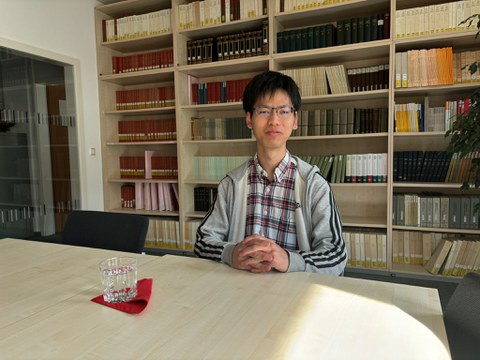Mar 19, 2024
Interview with Hikaru Itoh
Hikaru Itoh was a visiting researcher at the Research Center for Comparative History of Religious Orders (FOVOG) in Dresden in March 2024. In this short interview, he talks about his research at Tokyo Metropolitan University, his interest in German studies and the Japanese education system. The interview was conducted by Rebecca Hoppe.
What are your core research areas?
I am concentrating on Berchtesgaden Provostry, an Augustinian monastery in what is now Bavaria. This provostry is particularly fascinating because it held considerable political power. The location of the provostry was of great importance, which is why popes and kings granted it many privileges. In the 16th century, it was therefore referred to as a "Prince-Provostry". On the other hand, as an archdeacon of the Archbishopric of Salzburg, the provost was in charge of pastoral care in Berchtesgaden. The duality of the provost of Berchtesgaden as a prince on the border and as a prelate in the church is extremely interesting for me. That is why I have chosen the political and clerical interrelationships as my core research areas.
How did your interest in the Provostry of Berchtesgaden come about?
I chose German Studies as my subject area for my Bachelor's degree and spent a year in Salzburg - this is where my interest in the history of Salzburg began. At that time, I realized that Berchtesgaden has many connections with Salzburg and then turned my attention to the provostry.
Studying German and learning the German language is certainly demanding. What sparked your interest in German studies?
To be honest, I didn't give much thought to which language I wanted to study. I was mainly interested in music and the history of Germany, which ultimately led me to choose German Studies. At the beginning of my studies, I had difficulties with the German language, but as I now read and listen to a lot in German, the language is also becoming easier.
Will you continue to study German in the future?
Probably yes. I'm currently delving into the history of religion and dealing with church topics in general. Although I haven't finally decided which direction my research will take, I'm sure it will stay within these fields.
Due to the great distance between Japan and Germany, your field of research is probably not very well known in Japan. Do you think that many Japanese people are interested in German history and church history in particular?
I think Germany is quite popular in Japan, including its history. Accordingly, my degree program is quite large. When I tell people that I study German history, few people are surprised. I would say that many Japanese people have heard of Germany, know the history, but don't have an in-depth knowledge of it - that's sometimes challenging for me.
Is this due to the school education in Japan?
In high school, we get an overview of "world history", covering European history from the Frankish Empire to the Second World War. In middle schools, however, the curriculum is very different.

